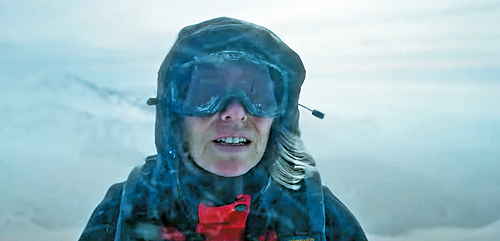(Not) Just the Facts
Infinite Storm and the dilemma of when to diverge from the "true" of "based on a true story."
By Scott Renshaw @scottrenshawLife is not dramatically tidy. Intuitively, we understand this, yet the matter always gets messy when we're dealing with movies based on real people and actual events. Every year, it seems, some awards-season favorite comes under fire for the way it purportedly altered or whitewashed the real-life circumstances on which it was based—sometimes for perfectly legitimate reasons, and other times because it's an easy piece of public-relations dark-ops by the competing films. Altering reality for dramatic expediency is endemic to the form; the only question is, how much re-writing of history is acceptable in the name of making a better movie?
Infinite Storm isn't exactly based on a high-profile story or person, and it's unlikely to be drawing much attention when next year's awards season rolls around. Yet it provides an interesting case study in asking that question about poetic license. Maybe giving a fact-based story a more conventionally satisfying dramatic arc is the best way to appeal to audiences. And maybe it's simultaneously a way to erase a lot of what's idiosyncratically interesting about the real-life story in the first place.
That real-life story takes place in fall 2010, when Pam Bales (Naomi Watts)—an experienced search-and-rescue professional living in New Hampshire's White Mountains—decides to take a solo hike on a day with an iffy weather forecast. The hike gets harder when a severe storm blows in, complicating the return trip even for a veteran hiker. And that return gets even more complicated when Bales stumbles upon a lone man (Billy Howle), dressed in shorts and sneakers, already hypothermic and likely incapable of traveling on his own.
Director Malgorzata Szumowska and screenwriter Joshua Rollins get the story off to a solid start with quiet, observant scenes capturing Bales' methodical preparations for her hike. At its best, Infinite Storm works as a kind of procedural thriller about how surviving in nature depends on being ready to have to survive in nature—or, in this case, being ready to help other people survive in nature, as well.
It's also a portrait in competence under pressure, which Watts accomplishes wonderfully. She has been a terrific screen actor from literally the first moment she got a showcase for American audiences, in David Lynch's Mulholland Drive, but she's only grown savvier over the years at playing complicated, prickly women. Playing a role that easily could have been a saintly savior, Watts makes Bales frequently exasperated at the apparent surrender of the man she calls "John." She amplifies the sensibility in Rollins' script that while yes, there was certainly a component of heroism in Bales' rescue of John, it was also someone just doing their job—and every job has its moments when you're just annoyed about having to do it.
All of those things are working in Infinite Storm's favor—and then there are the issues that are mostly extra-textual. Rollins builds in a backstory for Bales that involves a tragic incident that gradually unfolds in flashback, and indeed makes the day of Bales' hike the anniversary of that incident. It's an effective way to make the narrative a kind of redemption story for Bales ... except that there's no evidence from any of the contemporaneous reporting about Bales' rescue operation that the tragic incident in question ever happened. And even if it did happen, linking it with the rescue feels tidy to the point of being exploitative. Infinite Storm has a lot going for it as a basic survival narrative; turning it into yet another movie about Capital-T Trauma feels like someone turning to the Screenwriting 101 textbook rather than trusting the actual story.
Things get muddied again during the extended epilogue, which explores what happens after Bales and John get down the mountain. Without spoilers, it's another shift from actual events that probably has a more conventional level of audience-appeasement to it, but removes something distinctive and memorable that really happened.
Do the filmmakers owe audiences reality, when fiction is often more satisfying? Not necessarily. It is reality, though, that generally delivers the unexpected—and it's also worth asking if fitting reality into a more easily-consumable package scrapes away a lot of the spiky unpredictability that makes real-life stories worth telling.
More by Scott Renshaw
-
Film Reviews: New Releases for April 19
The Ministry of Ungentlemanly Warfare, Abigail, The Beast, Hard Miles, Sasquatch Sunset and more
- Apr 19, 2024
-
Faces of Salt Lake County book and portrait reception
Images and personal stories in a new book reveal local demographic diversity
- Apr 17, 2024
-
Feature film review: THE BEAST
A filmmaker's compelling ideas get a bit tangled in references to his creative influences.
- Apr 17, 2024
- More »




